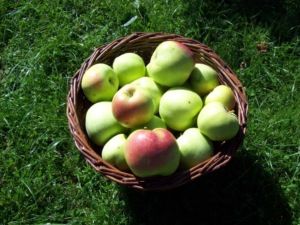News
Presenting Denmark’s tastiest apple, but few have tried it
This article is more than 7 years old.
It is only thanks to gene banks operated by the University of Copenhagen that the country continues to produce its prized pick

The ‘Filippa’ apple is Denmark’s best apple, according to researchers at the University of Copenhagen (photo: Tasnu Arakun)
“The apple just tastes so good! There is so much aroma and freshness in it,” Bo Stampe, an apple enthusiast and professional based in Rødding, told DR.
For Stampe there is nothing quite like the pleasure of eating a ‘Filippa’ apple, but sadly only a chosen few get to experience it.
Regarded by many as the country’s tastiest apple, it is a poor match for modern consumerism and is seldom sold in Danish shops.
18 gene banks all accross Denmark
Stampe works at ‘Noah’s Ark’ Rødding, one of 18 gene banks spread across Denmark that belong to the University of Copenhagen.
He helps to both preserve rare apple varieties like ‘Filippa’ as well as produce fruit and plants for research at the university and the Nordic gene bank.
The ‘problem child’ of pome fruits
He and his colleagues have their work cut out for them: this special kind of apple variety is the ‘problem child’ of all pome fruits, as it’s not suitable for commercial sale.
Its fragile physique just doesn’t fit the current conditions provided in the greenhouses favoured by Danish supermarkets.
READ ALSO: Best-known Danish apples are immigrants, claim researchers
According to Stampe, the trees can’t be trimmed or else they would stop growing. At the same time, its branches are so thin they could easily break and the apples fall off. And if this wasn’t enough already, the apples don’t mature simultaneously and require a long period of time.
Working for what’s yet to come
“We do not know what the apples of the future will be like,” said Stampe. “Maybe, we will use them for completely different things.”
Therefore, the genetic banks’ main priority at the moment is grooming varieties like ‘Filippa’ for what might await them in the unknown future.










































